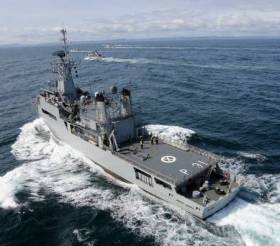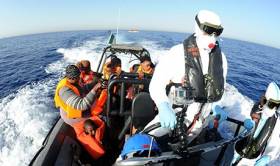Displaying items by tag: Migrant Med Crisis
#EithneToMed - Patrol vessels of the Naval Service will be deployed for a third summer of humanitarian operations in the Mediterranean.
As Independent.ie writes the Naval Service flagship, LE Eithne, has been assigned to begin the rotation of three ships in the Mediterranean on rescue operations for migrants attempting to reach Europe from North Africa.
It had been expected that the 33 year old vessel would depart Haulbowline Naval Base in Cork on May 1 but that departure was rescheduled pending final Government approval and will depart tomorrow.
Defence Minister Paul Kehoe will wish the vessel and 72-strong crew under Captain Brian Fitzgerald well as they depart Haulbowline Naval Base at 11am.
The first deployment under Operation Pontus 2017 will last for three months with two further Naval Service patrol vessels expected to be deployed until next November.
Ireland first dispatched Naval Service vessels to the region in 2015 amid concerns over the number of migrants drowning in the Mediterranean after leaving North Africa, in particular the Libyan coast, on flimsy inflatable craft.
The inflatable craft were totally unsuited to the journey and were almost always dangerously overloaded by ruthless people smugglers.
Hundreds of migrants have drowned as a result.
LE Eithne completed a previous deployment to the Mediterranean alongside other Irish patrol vessels including LE James Joyce, LE Samuel Beckett and LE James Joyce.
Irish crews work under the direction of the Italian Navy and Coastguard.
For much more on the story, the newspaper has more to report by clicking here.
#RoisinRescues - Once again the Naval Service OPV LÉ Róisín has been kept busy having been deployed in successfully locating and rescuing migrants in the Mediterranean Sea.
The operations carried out on Monday involved the saving of 371* migrants in total, following requests organised by the Italian Maritime Rescue Co-Ordination Centre. This saw three separate rubber vessels located 37 nautical miles north-west of the Libyan capital Tripoli.
The first rescue commenced at 6.50am, a total of 114 migrants are now on board and are receiving food, water and medical treatment where required.
LÉ Róisín was immediately re-tasked with the rescue of a further 115 people from a rubber vessel in the same area. All persons were on board by 9.15am.
The final operation search and rescue operation took place again north-west of Tripoli, where a further 142 migrants were taken on board.
*Figures for these operations are provisional until confirmed by the Italian authorities.

























































